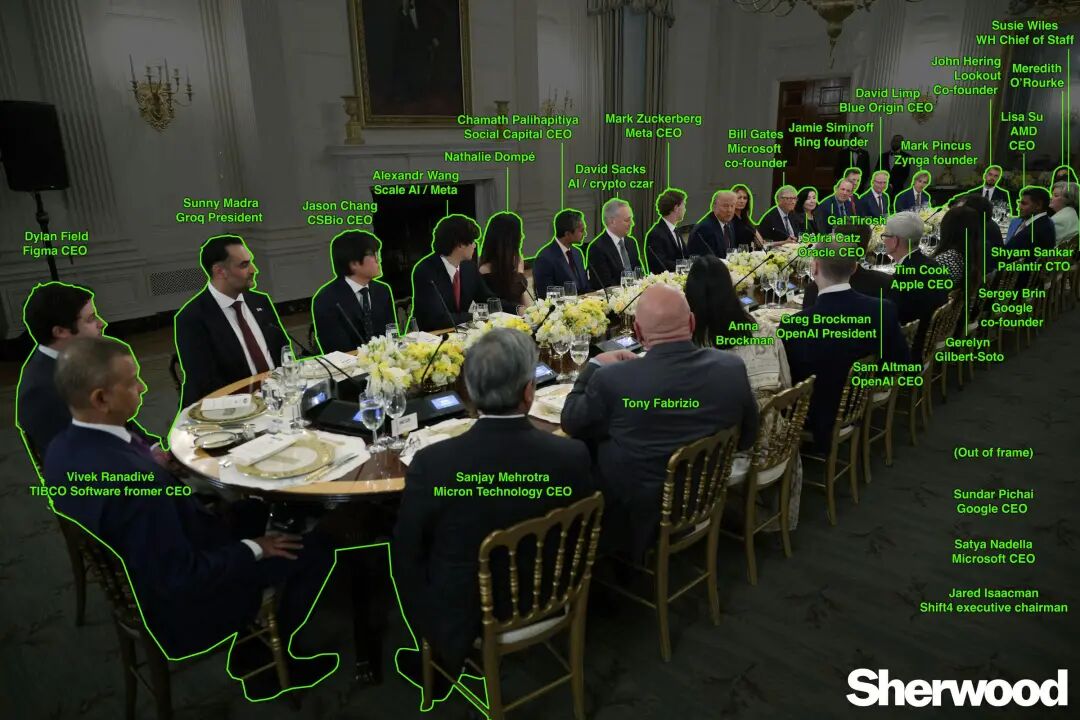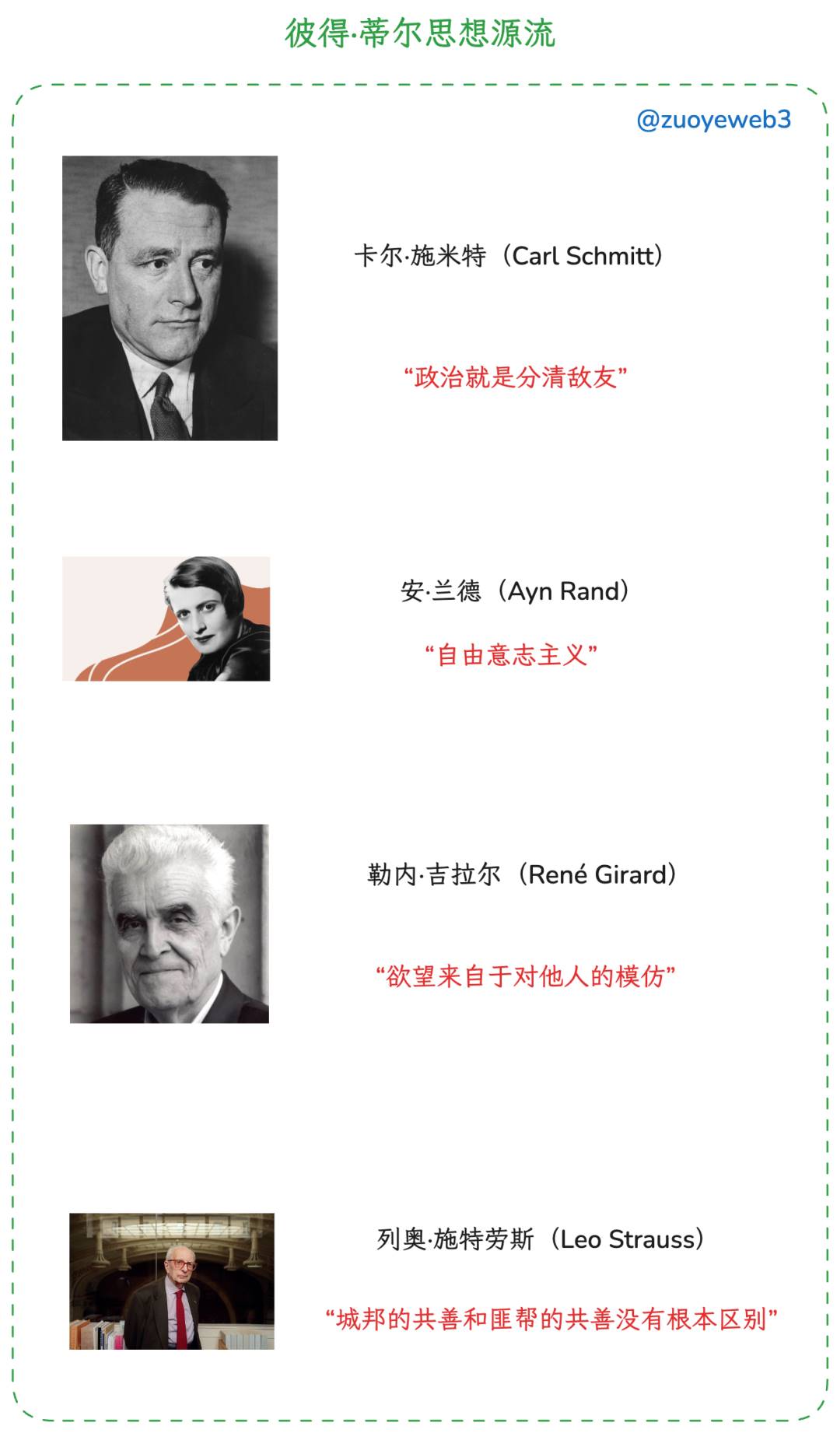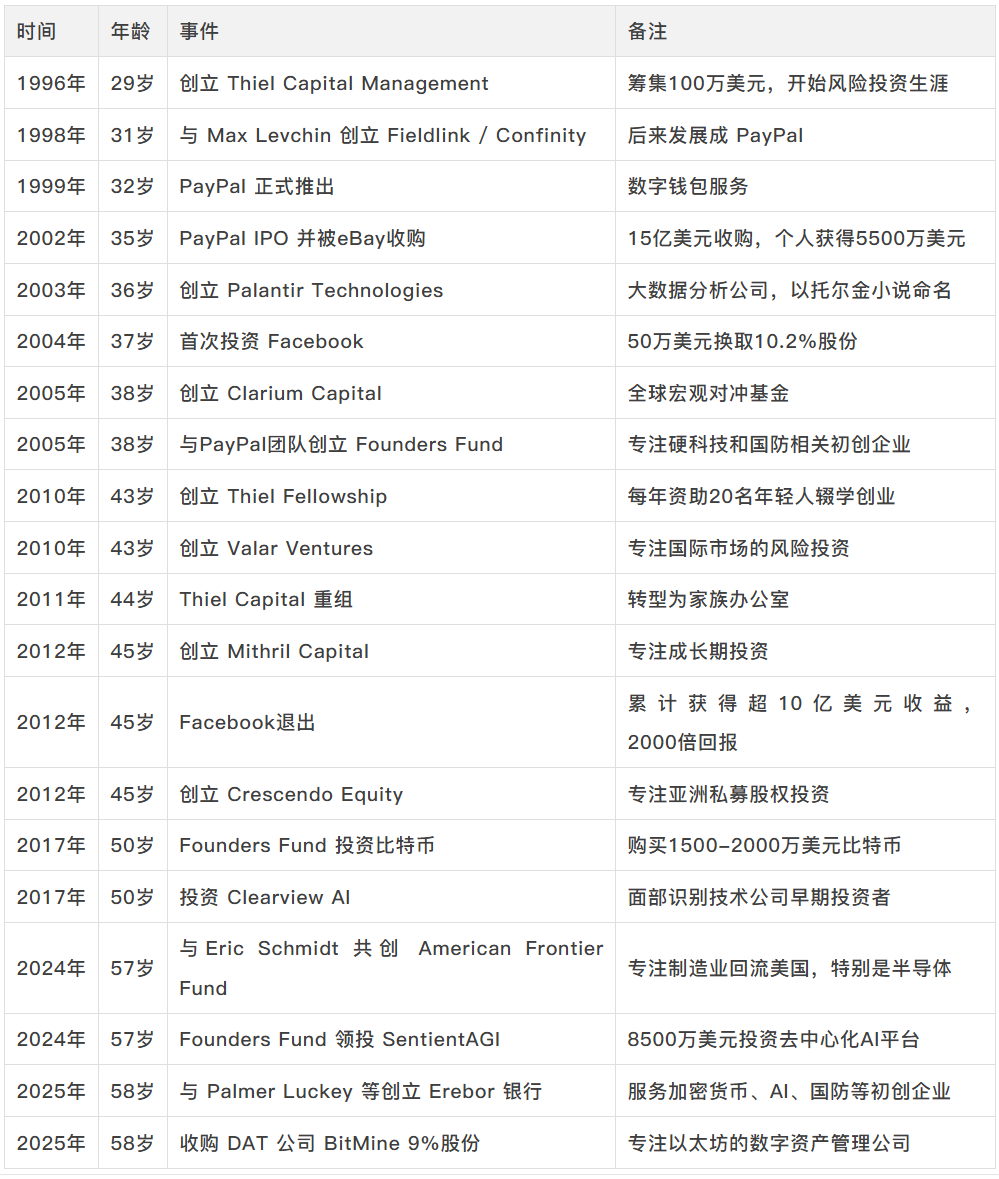When technology and finance integrate, the political power balance in Washington will also tilt. This is the subtext of cryptocurrency and AI, pushing Wall Street out of productivity and the financial system, allowing right-wing tech giants to take over everything in America and the world.
On September 4th, at the White House technology conference, a group of Silicon Valley elites gathered around the round table, but Peter Thiel was absent.
From left to right, the CEO of Figma is a Thiel scholarship recipient, Scale AI is a unicorn nurtured by Founders Fund, David Sacks is not only the crypto czar at the White House but also Peter Thiel's right-hand man during the PayPal era, Meta CEO Mark Zuckerberg is the first representative work of Peter Thiel's Silicon Valley venture capital legend, Palantir is a major contractor for Trump's Iron Dome project, and Peter Thiel was also one of the earliest investors in OpenAI.

Distant people and distant places are all related to Peter Thiel.
On the eve of 9/11, Charlie Kirk died in Utah, and the world only knows that Vance carried his coffin and Trump lowered the flag. What is not known is that it was Charlie Kirk who completely changed Vance's view of Trump, leading him to abandon his future within the system as a Yale law PhD and choose to go all in on Trump.
Coincidentally, Vance is also the deepest nail that Peter Thiel embedded in the MAGA movement and Washington. Behind them, the right-wing in Silicon Valley is devouring the entire Western world.
Wall Street cannot save the Federal Reserve, and the banking industry cannot stop stablecoins.
Right-wing America, after 15 years of planning by Peter Thiel, has appeared before the world and will shape the next era of cryptocurrency, AI, and world order.
The Collapse and Reconstruction of Western Order
Musk is anxious about the white birth rate, and Peter Thiel despises the morality of slaves.

After World War II, a large number of Germans fled the European continent and settled in Latin America and southern Africa, especially in Swakopmund, Namibia, where they even celebrated Hitler's birthday on April 20, 1989, revealing their ideology.
Born in 1967, Peter Thiel moved to Namibia at the age of 4 and returned to New Rome, California, at the age of 10. Unlike Musk, who spent his entire childhood in South Africa, Peter Thiel's impression of Namibia and South Africa was that they were "white" societies.
At that time, both South Africa and Namibia were under apartheid and colonial rule, representing the longest-lasting colonial order after World War II. This is a shared historical memory for Musk and Peter Thiel, with the difference being that Peter Thiel's childhood was focused on anti-authoritarianism.
He opposes the forced freedom of others while hoping to continue the West's authority over the world. All the twists and contradictions stem from this core.
Politics is about distinguishing friend from foe. Carl Schmitt is called the spiritual mentor of the Nazis, and some believe he is Peter Thiel's guiding light. However, Peter Thiel recognizes that the political order after World War II is ambiguous.
You are in me, and I am in you; the East-West confrontation in the late Cold War was ideological and also a cultural war. From the hippie movement to the Reagan era of the 1980s, a generation of Americans walked towards self-destruction in confusion.
By at least 1985, before Peter Thiel entered Stanford, he had already read "Atlas Shrugged." Unfortunately, Ayn Rand had passed away in 1982, and she did not witness the glorious moment when libertarianism swept across America—Reagan's presidency.
Fortunately, in 1987, Peter Thiel founded the "Stanford Review," vigorously promoting neoconservatism and libertarianism. He did this in response to the university's actions, as Stanford replaced Western cultural courses with "diversity" courses.
The efficient leftward shift of the West Coast, also known as the diversity movement, did not stop even during the Reagan era. However, under the long-term efforts of Reagan's fellow believer Trump and Peter Thiel, we have begun to see signs of submission.
Long-term efforts, Peter Thiel's consistent style, even led the "Stanford Review" to be called a right-wing stronghold in leftist Stanford. Peter Thiel has long sponsored and maintained contact with key members, and the so-called PayPal mafia originated from this.
Throughout his academic career, the philosopher René Girard had the greatest influence on Peter Thiel. Girard's most famous theory is that "desire comes from the imitation of others." Like Ayn Rand, Girard does not accept the Christian theory of original sin, placing human nature within an objectively discussable rational framework, ultimately legitimizing innovation, especially technological innovation.
Peter Thiel once said, "People want flying cars, but what they get is 140 characters." The root of this theory lies in Girard. Whether he likes it or not, Girard has indeed become the ideological source of the right in Silicon Valley.
In 2011, Peter Thiel again criticized the current Silicon Valley in a speech as pseudo-innovation, not focusing on true human frontier technology. Among the audience at that time was someone named Vance. In 2010, Peter Thiel had already established the Thiel Fellowship to sponsor college dropouts with dreams, including Figma CEO Dylan Field and Ethereum founder Vitalik.
Even more outrageous was the 2016 presidential election. In Silicon Valley, which collectively obeyed the Democratic Party, Peter Thiel began to bet against Trump. Remarkably, even after Trump's defeat in 2020, Peter Thiel continued to invest in Trump, even resigning from the Meta board in 2022 for this reason.
In contrast, Soros is the open line of the Democratic Party, Peter Thiel is the dark line of right-wing America, and Musk is the chaotic line.
Before the results of the 2024 election were announced, Microsoft revoked its LGBT policy, and Bezos, who owns The Washington Post, demanded that the editorial department not take sides. At that time, Zuckerberg was still indecisive until he suddenly realized on September 4th and pledged allegiance.
Peter Thiel treats money as ideology, while Soros hides ideology in politics; both paths lead to the same destination.
Peter Thiel's ultimate goal is not to protect his own interests or expand the rights of homosexuals, but to maintain the imagined super community—the survival of Western civilization, viewing white America as equivalent to the Western city-state, resisting all foreign attacks on the spirit of ancient Greece.
Earning the Beta of the Entire Market
Chaos is a ladder, and cracks are spaces.
Peter Thiel's Investment Timeline

Venture capital and political speculation may seem unrelated, but the core of both is to turn expectations into reality, buying a vast future at a discount with a small cash flow.
In 1995, before venturing into venture capital and founding PayPal, Peter Thiel co-authored "The Myth of Diversity: Multiculturalism and the Politics of Intolerance at Stanford University" with David Sacks, emphasizing that ideology comes before products and money.
In fact, as early as 1992, after graduating with a PhD from Stanford, Peter Thiel went through several rotations before seizing the madness before the internet bubble, founding Thiel Capital Management in 1996 and raising about $1 million from family and friends.
In 1998, Confinity was established, and Max Levchin designed anti-fraud measures related to CAPTCHA and discussed digital currency experiments with Peter Thiel. The cypherpunk movement developed alongside the commercialization of the internet, but the two quickly went their separate ways.
At that time, not to mention digital currency, even the internetization of the dollar had not yet begun; credit cards were still the preferred method of cashless payment. However, Peter Thiel happened to identify with libertarianism and saw the greatest advantage of internet dollars—regulatory arbitrage, with the gambling industry having a strong demand for it.
In 1999, PayPal officially emerged. For Americans, it symbolized freedom, allowing for easy transfers without complex review processes, just an email. For the world, it represented a necessary means of preserving value, as people needed dollars to escape inflation.
At this time, the dollar was a stable currency, just as stablecoins are stable dollars.
Just as MGX used USD1 to pay Binance for a $2 billion investment, PayPal's acceptance of a $3 million investment was also through PayPal.
There is nothing new under the sun; internet dollar arbitrage credit cards, stablecoin arbitrage internet, and PayPal's entry into PYUSD also understands this well.
But for Peter Thiel, this cannot be called success. PayPal collided with Musk's X.com at the same time, ultimately resulting in a merger, and it wasn't until 2002 that it went public and was acquired by eBay for $1.5 billion, at which point Peter Thiel's net worth was $55 million.
At 35 years old, Peter Thiel finally achieved financial freedom just before being optimized out.
Subsequently, Peter Thiel began to hide himself. Max Levchin, David Sacks, and even Musk can all be categorized as the PayPal mafia, meaning they acted in concert. For example, Peter Thiel invested in Musk's Tesla and SpaceX, forming alliances, just like during the "Stanford Review" period.
Long-term efforts, once again long-term efforts, the network of relationships Peter Thiel built through venture capital ultimately grew into a towering tree that overshadowed everything.
After 9/11, the U.S. government invested heavily in the security industry, and for the anti-authoritarian libertarians, cooperating with the government was anti-freedom, while not cooperating was anti-Western. In this awkward situation, Peter Thiel faced a spiritual crisis.
To resolve the spiritual crisis, Girard was not enough, and Carl Schmitt was not enough; ultimately, Leo Strauss came to the rescue:
The common good of the city-state and the common good of the gang have no fundamental difference; the common good is derived from calculating private goods.
If science can progress infinitely, there can be no meaningful end or completion of history.
Technology is justice, and virtue is knowledge.
Strauss is a prominent figure in both China and the U.S., but the significance is entirely different. For the non-religious rational person, Strauss provided a complete spiritual lineage from ancient Greece to Alexander to ancient Rome, equating the West with human civilization, a kind of resonance beyond Christianity.
Homosexuality, civil rights, and slavery together constitute a republicanism that excludes foreigners, which is also the last piece of the puzzle in Peter Thiel's spiritual world. Only through the interaction between the city-state and people can the rule of the philosopher-king be correct and lasting.
In summary, Peter Thiel believes that the West needs to be great again, and the path to greatness is technological innovation, which requires dismantling regulatory barriers.
From ocean islands to Mars colonization, and even life sciences for longevity, everything should be thoroughly accelerated, accelerated to the point where technology's frenzy cannot be stopped, accelerated to the historical return, using technology to achieve a second coming of ancient Greece, allowing sinners to be saved.
And the most ironic part is that Leo Strauss is the spokesperson for neoconservatism, advocating for total acceleration due to the decline of the West, thereby loosening the constraints on the West to regain vitality.
This is the synonym for e/acc's accelerationism, as well as the effective altruism pathway insisted upon by SBF, and even Musk's long-termism aligns with this. Long-termism is not about persistence equating to victory, but rather about accelerating towards ultimate victory.
Today I realize I am who I am. In 2003, Peter Thiel founded Palantir to mine big data for potential terrorist signals, with the CIA and security departments as its largest clients, propelling his life into the fast lane.
In 2004, he invested $500,000 in Facebook, acquiring a 10.2% stake, fully proving that Peter Thiel is not a theorist but a highly effective actor.
In 2005, Founders Fund was established, allowing Peter Thiel to establish his dominance in the venture capital field. The goal of Founders Fund is not to "make money," but to create technological products for human civilization, such as AI and cryptocurrency, as well as hard tech, rather than continuing to spin within 140 characters.
To summarize Peter Thiel's achievements in the investment field with numbers, he is a true practitioner of financial capitalism's bottom-right, once again emphasizing that he is the Republican mirror of Soros:
• Co-founder of PayPal: $55 million exit
• Early investment in Facebook: $500,000 turned into over $1 billion
• Founder of Palantir: Valued at tens of billions of dollars
• Personal net worth: $20.8 billion (2025), ranked 103rd globally
Peter Thiel has not only achieved economic success but, more importantly, he has changed or attempted to change the balance between the East and West coasts. Before him, the West Coast was home to tech elites, while the East Coast was a financial and political complex. When businesses grew, they had to enter the government and participate in Washington's political games.
If technology and finance integrate, the political power balance in Washington will also tilt. This is the subtext of cryptocurrency and AI, pushing Wall Street out of productivity and the financial system, allowing right-wing tech giants to take over everything in America and the world.
Musk is shouting, while Peter Thiel is acting.
Conclusion: He Changed Silicon Valley
From founding the "Stanford Review" to sending Trump back to the White House, Peter Thiel has realized the return of neoconservatism in the freest Silicon Valley, embedding a dual insurance combination of Vance and Trump in the most entrenched Washington.
In Trump's political landscape, practitioners of crypto, fintech, and AI from the West Coast have gradually replaced the traditional elites of Wall Street, which is the most significant part of this major political upheaval in the United States.
KK once wrote "What Does Technology Want?", arguing that technology has its natural developmental tendencies and will ultimately free itself from human subordination, which is what Musk criticizes as "anti-human centrism." The primacy of humanity may not be guaranteed with the explosive growth of AI.
Before this, Peter Thiel wanted to first attempt to save the core part of humanity—the Western world. Of course, this is filled with Western-centric racial overtones. Unlike Larry Ellison of Oracle and former Google CEO Schmidt, Peter Thiel's disdain for foreigners is not an emotional hatred but a rational desire.
Love for the Greek city-state must be marked by hatred for the foreigner.
No matter how much the power of the West has declined or how great the dangers it faces may be, the decline, danger, failure, and even destruction of the West do not necessarily prove that the West is in crisis: If the West is confident in its goals, it could gracefully decline.
In a sense, through Peter Thiel, Girard has indeed changed the world, but it is not enough.
The shortcoming lies in the spiritual crisis of humanity. A rational West has no place for God, making the West itself indefinable. Peter Thiel's choice is Leo Strauss, to reshape the Western spirit from the rationality of ancient Greece.
In human governance, the philosopher-king is the ruler that most aligns with Strauss's ideals. Machiavellianism is merely a poor imitation. If a philosopher-king cannot be found, then an aristocratic republic is the most rational city-state governance. Both democracy and tyranny will gradually shed the garments of civilization under the erosion of foreigners, becoming synonymous with the foreigner.
免责声明:本文章仅代表作者个人观点,不代表本平台的立场和观点。本文章仅供信息分享,不构成对任何人的任何投资建议。用户与作者之间的任何争议,与本平台无关。如网页中刊载的文章或图片涉及侵权,请提供相关的权利证明和身份证明发送邮件到support@aicoin.com,本平台相关工作人员将会进行核查。




